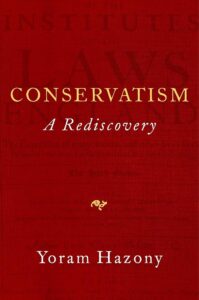The upheaval in parts of our country makes the idea of a beach vacation even more compelling than usual. But you can’t leave your concerns behind entirely, so take these books off your shelf and look for the best ways forward. Each has a longer review in an issue of inFOCUS Quarterly (date supplied). But never mind the review – read the books.

I Love Capitalism – Ken Langone (Spring 2019)
Start with a mood-lifter. This is the happiest book going about economics, economies, people making money, and people spending it. Capitalism, contrary to the rising flock of young “socialists” who refuse to look at the socialist hellhole that is our sad neighbor Venezuela, is the best way ever devised to let people rise, live well, spend money, and give it away in large chunks…
Capitalism is not a charitable institution, but capitalism provides the means for charitable people to help others. Langone and his wife made a gift to NYU Medical School that made the institution tuition-free.
Capitalism, then, is the mechanism by which people can start with very little, work very hard, and end up better off. Not necessarily millionaires, but, according to Langone, no matter how many rungs you climb on the ladder, you are obliged to share your success. People across the book rise and Langone enjoys watching and helping…
Capitalism, which allows for maximum personal input into lives and business, is best able to account for all of those differences and reward them in the marketplace. No, it isn’t perfect. Yes, some people have less. Some people will have more and some of those won’t share. Langone regards it as an article of faith – he is a religious man – that those having more have to have a conscience.
 Dictatorships and Double Standards: Rationalism and Reason – Jeane J. Kirkpatrick (Fall 2021)
Dictatorships and Double Standards: Rationalism and Reason – Jeane J. Kirkpatrick (Fall 2021)
You Were Warned: The movement is:
- Universal
- Teleological
- Final
- Comprehensive
- Moral
- Promising an end to alienation
Can you name it? Whether you can or not, the late Jeane J. Kirkpatrick’s Dictatorships and Double Standards: Rationalism and Reason in Politics is your next important read.
And hurry up.
In his 1967 gubernatorial inaugural address, Ronald Reagan said, “Freedom is a fragile thing and it’s never more than one generation away from extinction. It is not ours by way of inheritance; it must be fought for and defended constantly by each generation.”
If a generation is normally defined as 20-30 years, we’re late.
In one of his rare public pessimistic moments, Reagan added in his gubernatorial address that freedom “comes only once to a people. And those in world history who have known freedom and then lost it have never known it again.”
Published in 1982, Dictatorships and Double Standards is not easy, but it is crucial.
 The Word-Deed Connection: The Utopian Conceit and the War on Freedom – Juliana Geran Pilon (Winter 2020)
The Word-Deed Connection: The Utopian Conceit and the War on Freedom – Juliana Geran Pilon (Winter 2020)
Pilon spotlights the repeated word-deed connection, from an ideology that must not be contradicted to the necessary mass slaughters of those – early Christians, the bourgeoise, capitalists, kulaks, natives, blacks, whites, Jews, Zionists or any “other” depending on time and place – whose beliefs or very existence contradict the true believers.
Americans can hear the one-size-must-fit-all demand for perfectibility, for utopia, in the intolerance of today’s “woke progressives.” The anti-liberal left detests the capitalism that sustains it – capitalism resting on private property and the personal liberty to acquire and use it.
They promise a perfectly equal, perfectly just, essentially classless society here, and, if not now, then soon. As soon as the remaining class enemies, enemies of the people, of the faith, of the race, of the party can be eliminated.
The utopian conceit has been especially dangerous for Jews.
In their pursuit of earthly utopia, with themselves in charge, too many Western intellectuals reject the classical liberalism of the Founders who led the American Revolution. Geran Pilon recalls that these widely read practical men of experience did not overthrow an existing social order yet devised something new on Earth. This was constitutionally limited government, strong enough to protect individual citizens enjoying their God-given rights including life, liberty and the pursuit of happiness, but lacking power to disregard or dispose of those rights.
 To Ponder and Discuss: Conservatism: A Rediscovery – Yoram Hazony (Fall 2023)
To Ponder and Discuss: Conservatism: A Rediscovery – Yoram Hazony (Fall 2023)
This is the political philosophy class you didn’t take in college; actually, it’s probably better than the political philosophy class you didn’t take in college.
Hazony provides lots of information, draws very disconcerting conclusions, and asks disturbing questions – much of it politically incorrect by today’s definition. Which is the point. Hazony, chairman of the Edmund Burke Foundation and president of the Herzl Institute, is an unabashed proponent of British political philosophy and its conservative American extension, leading to the sort of representative democracy we have, and disdainful of American political liberalism.
And that’s OK, he posits. Check out this politically incorrect thesis: “Not everyone is equal in deserving honor.”
Discipline, personal and governmental, is a key to freedom and democracy. The list of obligations for a citizen in actual “democracy promotion” is long. Have we lost the discipline the Founding Fathers believed necessary to hold a country together – or even to hold a society together – or even to hold a family together? Hazony is not a defeatist, but he recognizes that those who choose the “conservative” route will end up working harder.
Wherever you fall on the liberal/conservative spectrum, you will find yourself wanting to argue with Hazony. Better would be to argue with your friends and especially your political adversaries in search of that common ground that has held the United States together for nearly 250 years. And, perhaps for the next 250.

Return to the Founders’ Constitution: Supreme Disorder – Ilya Shapiro (Winter 2021)
Through Reconstruction up until the New Deal, legislators legislated, and the Supreme Court measured legislation against the Constitution. The advent of media – and now social media – brought citizens across the country into the halls of power, peeking under the table and over the shoulders of powerbrokers. This creates an apparently irresistible temptation for politicians to become actors, and journalists to become “media personalities.”
Under those circumstances, the selection and vote for a nominee becomes an event in a way it never had been before. And Justices are now understood to sit on the Court to advance policy – the policy of the political party that appoints them. The politician’s temptation becomes planning on a Justice making policy for the country, instead of evaluating the constitutionality of measures enacted by the legislative branch and signed into law by the Executive.
It also allows Congress to evade its responsibilities by writing broad outlines of law, then commanding the Executive Branch to write policy rules and regulations, when Congress should write laws, not hopes and dreams.
Therein lies the problem, according to Shapiro.
The question of the court’s legitimacy is primarily one posed by progressives. But, it isn’t the Court that has failed the American people. The problem is that the Court is presently filling in for the inability of Congress to legislate.
President Abraham Lincoln was both timely and prescient in 1861, when he said, “If the policy of the government upon vital questions…is to be irrevocably fixed by decisions of the Supreme Court… the people will have ceased to be their own rulers.”
 Need More? Try These:
Need More? Try These:
If Not Us, Who; If Not Now, When? Indispensable Nation – Robert J. Lieber (Winter 2023)
Indispensable” should not be confused with correct – or capable. An “indispensable nation” should never be confused with a country that always does the right thing or does it well. That said, Robert Lieber’s Indispensable Nation is probably an indispensable book.
He dissects the candidates for the title of “indispensable nation,” the United States, Europe (more than a notion but not a nation), Russia, and China. The chapter on Europe is worth the price of the book
 The Kennedys in the World: How Jack, Bobby and Ted Remade America’s Empire – Lawrence J. Haas (Spring 2021)
The Kennedys in the World: How Jack, Bobby and Ted Remade America’s Empire – Lawrence J. Haas (Spring 2021)
The Limits of American Idealism: The Kennedy brothers had a plan to remake non-Western and non-democratic countries over in our image – to help them, to save them. They never considered that those people might not want to or might not be able to. No one asked, “What if we push them into is NOT a version of ourselves, but a rift that allows communists, or jihadists, or anarchists or other despots to gain power?”
For all of the good intentions, there are limits to what American idealism can do; limits to what even Kennedys could do. On the other hand, where the Kennedy brothers were openly patriotic and admiring of the American political system and Western Civilization, today’s political leaders are running the other way.
 Ruled or Governed? Young Patriots – Charles Cerami (Fall 2020)
Ruled or Governed? Young Patriots – Charles Cerami (Fall 2020)
Ruled is when someone tells you what to do because they think they know better or God tells them or they have more money or the right color skin or more weapons or less compunction about stealing, beating, or killing people who don’t conform. [Slaves of any color in any country in any historical or present-day context have experience with this, as do Jews, Uighurs, Tutsis, Armenians, women, and others.] Governed is when people are periodically vested by the voters with the authority to represent the needs and wishes of their constituents in the laws they pass. Governed well is when the laws they pass protect the people they serve – including from the government. The operative words are “represent” and “serve.”

The great genius of the United States is that the Founders believed two things: that governing was better than ruling and that the nature of the American people and their government would evolve toward better. They did not believe in perfection.
And always:
The Israel Test – George Gilder (Winter 2024)
Shoshana Bryen is the editor of inFOCUS Quarterly and the Senior Director of the Jewish Policy Center.

